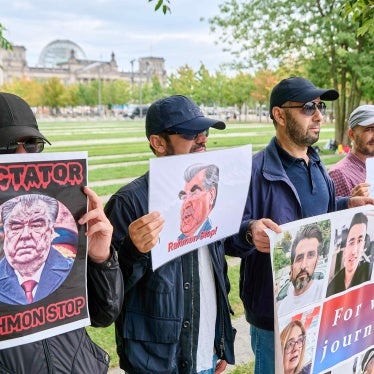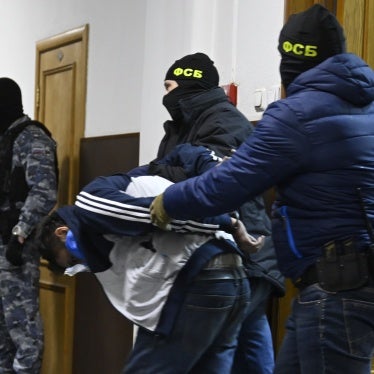Human Rights Watch was pleased to note in the recent six monthly activity report of the provincial and local human rights boards (Baþbakanlýk Ýnsan Haklarý Baþkanlýðý, Ýl Ve Ýlçe Ýnsan Haklarý Kurullarý, Temmuz-Aralýk 2004 Faaliyet Raporu) that some boards have been carrying out visits to police stations and gendarmeries. Supervising places of interrogation is probably the most effective way of ensuring that allegations of ill-treatment and torture continue to diminish, and is therefore a very welcome step.
According to the report, only twenty-five of the eighty-one boards have conducted visits to date, but presumably other boards will soon make such visiting part of their work. Such monitoring will help to sustain progress made so far in combating torture, and may save lives. As you know, until the mid-1990s detained persons and their interrogators were hermetically sealed off from the interest and concern of the outside world, and as a consequence torture, ill treatment, rape and death in custody were common. Access to police stations by the Committee for the Prevention of Torture (CPT), lawyers, prosecutors, and now human rights boards have directly resulted in the reduction in allegations of torture referred to in the European Commission’s 2005 Regular Report.
In the assessment of Human Rights Watch, provincial and local human rights boards are better suited for monitoring places of detention than for receiving and processing complaints. This is because in the vast majority of cases where a Turkish citizen has been the victim of a serious human rights violation, they have also necessarily been the victim of a serious breach of law. In investigating complaints of serious violations, the boards act in parallel to the judiciary – a role for which the boards lack appropriate expertise, investigative powers or sanctions. Moreover, the close ties between the boards and the offices of governors and sub-governors mean that they lack the necessary independence for an investigative role. In that context, the poor performance of the boards in dealing with complaints is not surprising. Human Rights Watch’s admittedly limited interaction with the boards in their investigative capacity has been extremely disappointing (see pages 6 and 7 of the attached briefing).
The boards’ relative lack of independence may present less of a problem for a monitoring function, particularly if delegations are arranged to include the representatives of the bar association and the medical chamber who are on all provincial boards. As you are aware, both the CPT (in 2002) and the U.N. Special Rapporteur on Torture (in 1999) have specifically recommended that police stations in Turkey should be monitored by a credible and independent body. Human Rights Watch shares the view that there is a need for fully independent monitoring, and we understand that the Turkish government is investigating such a step. But the advantage of monitoring by provincial boards is that the powers are already in place, and visits are already taking place, at least in some areas. Monitoring by the boards can play an important role, until such time as fully independent monitoring can be operationalized.
To further enhance the effectiveness and independence of the boards’ monitoring activities, the bar association and medical chamber representatives should be encouraged to take special responsibility for police station visiting, and should lead delegations carrying out this work. A separation of monitoring activities from the provincial governors’ offices is essential, particularly for unannounced visits. The Human Rights Presidency’s activity report does not make clear whether any of the visits were unannounced. Routine visits are valuable, but unannounced visiting is indispensable if the system is to be effective at reducing incidents of abuse.
The Human Rights Presidency’s activity report lacks information about the methodology of the visits, and with the single exception of the Ardahan human rights board, contains no information about the findings of those visits. If the visits are to ensure improvement in institutional practice, there must be a mechanism to ensure public feedback. This stream of information will also ensure the quality of the monitoring. The requirements of confidentiality may impose some limits on what can be disclosed. At the very least, however, the boards should indicate precisely which detention units were visited, the date and time of the visit and whether it was scheduled or unannounced. The substantive report should contain details of any allegations of ill-treatment, disciplinary measures taken in response, and referrals of evidence to prosecutors for serious offences arising from the boards’ visit (including irregularities in the custody record, obstruction of access to counsel, neglect of safeguards for minors, or cases of apparent ill-treatment or torture).
The website of the Human Rights Presidency would be an appropriate place to post reports of visits (as well as reports of visits by prosecutors and provincial governors carried out under the Prime Minister’s Office’s June 1999 circular).
Monitoring boards should be pro-active and inquiring in their approach to their work. For example, an effective and genuinely interested monitoring body would carry out visits to any police unit which had recently been the subject of reports of irregularity in detention procedures or ill-treatment. During the period covered by the Human Rights Presidency’s activity report, several such incidents occurred:
- In July 2004, eight detainees reported that they were tortured at the Anti-Terror Branch of Siirt Police Headquarters. The lawyer Abdülhakim Giden said that his clients Abdullah Gündoðdu, Tahsin Atak and Ýhsan Gülmak told him that police had stripped them naked, hosed them with cold water, beaten them and squeezed their testicles, and that he himself had been threatened by police for attending his clients. The Siirt provincial human rights board did not visit this police station subsequent to these allegations being reported in the press.
- In August 2004, seven members of a single family reported that they had been beaten during detention at Akhisar Police Headquarters in Manisa province. One of the detainees was held for five days, twenty-four hours longer than the maximum detention period allowed by law. In November 2004, two members of the same family were detained and again reported being beaten. One of the detainees, F. G. was a minor, and therefore should have been referred immediately to the prosecutor rather than held in police custody. The activity report indicates that Manisa board carried out monthly checks on three police stations, but did not visit Akhisar Police Headquarters.
- Fourteen year old H.Ö. reported that he was detained overnight on suspicion of theft at Basmane Police Station in Izmir on July 9, 2004 and beaten while in custody. Quite apart from the allegation of ill-treatment, the detention of H.Ö. was a serious breach of detention regulations, since, as a minor, he should have been immediately referred to the prosecutor or released. The Izmir board carried out an impressive 227 visits to police stations and gendarmeries between August and December, but since the information on their visits contained in the activity report was very limited, it is impossible to establish whether or not they responded to the report of the illegal detention and ill-treatment of the minor H.Ö. by visiting Basmane Police Station.
- On September 8, 2004, Ramazan Ýsmailoðlu, detained on allegations of theft, died in police custody at 5 Ocak Police Centre in Adana. According to the police’s account, he committed suicide by hanging himself in his cell. Adana provincial board visited police stations in the towns of Ceyhan and Yumurtalýk, but conducted no visits to 5 Ocak Police Centre.
- On September 30, 2004, Ömer Þiþman, detained for disorderly behaviour while under the influence of alcohol, died in police custody in Akçakoca Gendarmerie Headquarters, Düzce province. The Düzce board did not visit Akçakoca Gendarmerie Headquarters or any other custody units during the period in question.
The incidents of ill-treatment and deaths in custody noted above are sufficiently serious to warrant a high-level investigation of systems and practices in place at the custody units in question, and certainly a period of close vigilance by the provincial and local human rights boards.
Monitoring by human rights boards is a new initiative, and the boards could learn much from the experience the CPT has built up in conducting such visits throughout Europe over a decade and a half. Human Rights Watch recommends that the Human Rights Presidency of the Prime Minister’s Office (the body responsible for coordinating human rights board activities) obtains practical advice from the CPT on how visits can be carried out to the best effect, and how human rights boards can feed their findings back to the ministries and the public. It might be helpful if advice given by the CPT were carefully translated into Turkish and circulated to all board members.
The human rights boards’ venture into police station monitoring deserves to be encouraged and strengthened. It should be treated as a foundation upon which to build experience for the more sophisticated systems of independent police station visiting currently under consideration by your government, and a valuable stop-gap until those systems are in place.
In summary, in addition to giving a warm welcome to this new role for the human rights boards, we would like to recommend that the boards:
- Obtain guidance on effective visiting from the Committee for the Prevention of Torture;
- Maximise the independence of the visits by encouraging bar and medical chamber delegates to take the lead;
- Expand the program so that all provincial boards conduct both scheduled and unannounced visits;
- Take an active and inquiring approach in their visits;
- Ensure that visits result in detailed public reports.
Finally, since your government has made this move in the direction of independent monitoring of police stations, Human Rights Watch would urge you to sign and ratify the Optional Protocol to the UN Convention against Torture (OPCAT) which provides for a system of regular visits to places of detention carried out by complementary international and national independent expert bodies.
Sincerely,
Rachel Denber
Acting Executive Director
Europe and Central Asia division
cc:
Mr. Abdulkadir Aksu, Interior Minister, Ankara
Prof. Vahit Bicak, Human Rights Presidency, Office of the Prime Minister
Committee for the Prevention of Torture
Provincial Governors
Bar Associations and Medical Chambers throughout Turkey
Mr. Martin Harvey, Acting Head of Turkey Unit, European Commission
Ambassador Hansjörg Kretschmer, E.U. representation in Ankara
Ms. Aslýgül Üðdül, Director for Political Affairs, Avrupa Birliði Genel Sekreterliði, Ankara
British Embassy, Ankara
Danish Embassy, Ankara








